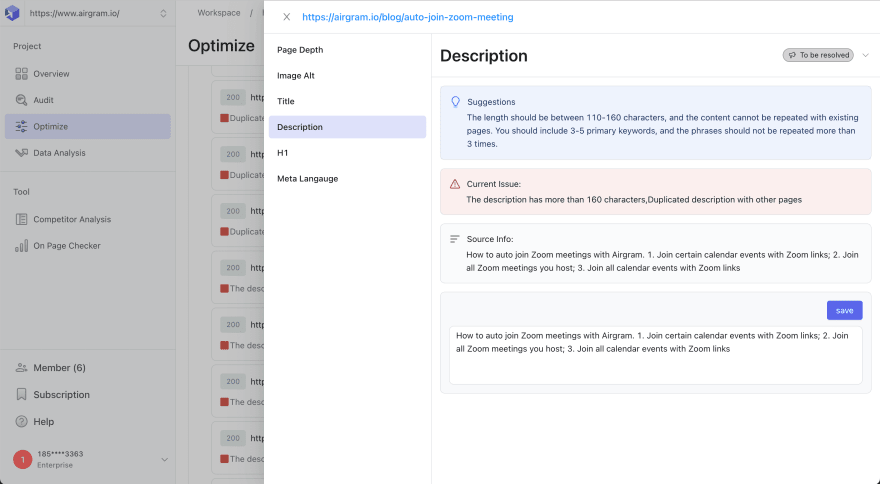You've just started hosting your website fresh new, and now what?
You might have wondered how people got to know about your website from the ever-huge internet. Maybe you can share it with your fellow friends, or maybe you can post them to some related communities like subreddits so that they know about your site.
But is that all?
Your presence and traffic could be quite limited if you don't try to promote yourself or stand out from similar websites. After all, it is guaranteed that the website you just created is not one of its kind on the internet.
This is where Search Engine Optimization (SEO) comes in.
Do you remember what you would do when looking for something new? Google, exactly. We head into the search engines with keywords and browse for something that catches our attention. If you can relate that we do this on a daily basis, this is exactly how you should showcase your website to all other people around the world.
But how?
Simply put, we're going to rank in the search engines.
That's it. We're going to place our websites on the very first page of the search engine, be it Google, Yahoo, or Bing.
Most people only spend their time browsing through the first result page. Some won't even scroll down to the bottom. That's why we have to be on the first page and even on the first few results.
Sounds hard? No worries. This article will guide you through the first step of optimizing your website for search engines.
Before we start all the steps, there's still something I'd need to tell you:
SEO isn't a fast thing. They start slowly, but they have great promises.
Starting SEO Steps by Steps
1. Audit Your Site
The first step you'll need to do for SEO is to audit your website.
The auditing process in SEO will analyze if your website has any errors or mistakes that might affect your website's performance in search engine results. A good auditing platform will list the exact problems you have and tell you what you should do to fix these problems.
Often, what we thought might be cool is actually deadly for SEO. For example, large video or image files.
This is a common mistake in SEO. We all hope that our users will get a clearer video or a more detailed picture, but sometimes it is not the case, especially when the internet speed is not always lightning-fast. When our users come onto our site but the graphics are not showing, it can be really frustrating. Even if they really liked your product, they might just leave disappointed and opt for another option.
I'll be using SEO-GO as a demonstration in this article, but you can use any SEO tools you like. Honestly, this is one of our side project created to serve our main site, but you can try it out as well :D
Auditing processes on most of these platforms are just easy and simple. Simply enter your website's URL and start auditing. The first step is way simpler than you could've thought of.
2. Improvising your website according to Technical SEO suggestions
Now that you've done auditing your website, you will have a better understanding of what your website is short of.
This is the trickier part because there are many to be considered. For example:
- Indexing Status
- Crawling Error
- Internal Links
- Sitemap
- Loading Speed
- Redirects
- Broken Links
- HTTPS and more...
We cannot just solve one single problem in technical SEO because it doesn't make many changes. We will have to resolve these problems one by one in the websites' code.
You can check out the detailed suggestions from the SEO tools for every problem and copy the snippets into your code if needed. If you're not the one who built the website, try communicating with your tech team and let them figure it out together with you.
3. Researching Relevant Keywords
Besides the technical part, there's a lot more to do on the contents too.
Creating high-quality content has always been one of the most crucial parts of SEO. You can't simply write anything you want if you're writing content for SEO, or simply following the trends. You'll have to research what your target audience is interested in and how you should engage with them.
Researching keywords is a way to look up how many interested users there are for certain keywords or topics. Even if these keywords or topics are trending hot, you'll also have to consider if your content can compete with them, or what other alternative keywords we have.
If you don't have any idea of what keywords your website should compete with, try comparing websites similar to yours.
You should analyze your competitor's websites and see what kind of titles, descriptions, and keywords they use. It is important to know what others are up to too instead of doing it blindly.
Simply put, SEO is about what your users want, push your website in front of them and let them love your content. If you're able to predict what they will search for, you definitely can bring what they want.
4. Writing Great Content
Now that you have a grasp of the keywords, we're going to talk further about creating content.
As important as keywords are for SEO, it doesn't mean that we should stuff all these keywords into our articles or content. If you really tried doing so, you might end up with something hardly readable, and it could be deemed as rubbish content for the search engines.
A good SEO article falls into one of these four categories:
- Foundational Articles
These articles are the basics and core content of your website. They consist of the main keywords and topics your website is about and introduce what you, your website, and your products are. Users learn about you and your features in these articles and why you stand out from other similar websites.
- FAQ Articles
Besides foundational articles, you can also write a series of answers to frequently asked questions and introduce yourself and your products in these articles. Be sure to include SEO-friendly links (basically links that are not broken) in these articles and make sure your products are relevant to the topics.
- Authoritative Articles
These articles could be those written by your client, sharing their experiences of using your product. This can be used to showcase how your product has helped them to achieve their result so that new users will trust your products.
- User Experiences
Other than all of these, don't forget to provide value for your users. Teach them how to use detailed features, share your opinions, and even make tutorials so that they can learn faster. Simply improving their user experiences on browsing your websites can also serve a good SEO purpose.
Overall, we will have to think about the value of our content and website when we're going for SEO. Are my users knowing what I'm delivering to them? Do they understand my product well enough? Are they feeling agreeable and positive towards my product? These are the questions that you might think about.
Just a reminder: if we simply create low-quality content for SEO, you're basically just helping your competitors and losing your rank in search engines.
How does the search engine ranking work?
Before ending this article, I would like to share something about search engine rankings. I did promise you that investing time in SEO can bring greater traffic and more users, but there's also a truth you need to know:
We can't control the search engine ranking the very way we want.
All we can do is spend our time understanding the algorithms behind these search engines, and try to optimize our websites according to these understandings. And to understand these algorithms, we'll have to know about our users, create great content for them, and offer them a better user experience.
It might sound hard, but it is definitely worth the time.
To sum up, think of SEO as going to the gym. We want the result of having a perfect body, but training is inevitable too. Most importantly, take your first step and plan further, and you'll see the results bloom in the process.












Top comments (0)